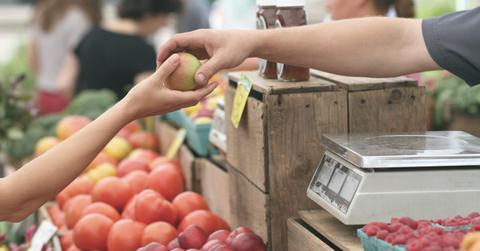4 Rules From The 'Zero Waste' Lifestyle Everyone Can Master
When it comes to living a zero-waste lifestyle, the very concept can feel overwhelming. Luckily, there are easy approaches to living waste-free that anyone can incorporate into their daily lives, starting right at home.
Updated May 23 2019, 10:57 a.m. ET
Can you imagine never having to send trash to landfill again? It sounds impossible, but there are tons of ordinary people doing it every day. Zero waste living was first coined by Bea Johnson, a champion for the lifestyle and author of Zero Waste Home. This way of life essentially encourages people to minimize their waste by following a practical rule of thumb: Refuse, Reduce, Reuse, Recycle, and Rot (compost).
But is this lifestyle really doable? In short, yes.
One reason this lifestyle is possible today is because it’s been done before. Civilizations have generally lived zero waste lifestyles up until our great grandparents' generation. There were no landfills overflowing with chemicals or oceans full of plastic until about a hundred years ago when these materials were invented. Since then, product manufacturers never looked back and over time, society could no longer fathom life without plastics and single use items.
For the less eco-conscious types out there, a zero waste lifestyle has direct personal benefits, too. In fact, anyone can begin to adopt this traditional eco-friendly lifestyle with minimal effort by looking closer to how older generations approached four main areas in their lives.
1. Think long-term when it comes to your clothes.
How we buy and treat our clothes has completely changed in just a few decades. According to Caldwell, a capsule wardrobe company, the average American owns nearly three times as much clothes as they did in 1930. Instead of falling prey to fast fashion, opt for pieces that are well-made, classic, and that you’ll actually wear. If you skipped home economics in high school and don’t know the first thing to repairing holes or tears from extended use, opt for companies like Airtailor that can mend your clothes for you.
2. When possible, buy local food and purchase it in bulk.
A hundred years ago, people took time to prepare real meals from real food. Today, fast food has changed the game and even store bought foods are often created with mystery ingredients written on hard to recycle packages. Solution? There are a growing number of bulk stores popping up around the country that offer package free food which is almost always better priced. You can use the bulk store finder to quickly pick a location near your home.
3. For hygiene products, go for reusable, not disposable.
Almost everything in our bathroom cabinets is disposable, but do they have to be? You can easily swap out most of your toiletries with items made of metal (safety razor, nail file), wood (bamboo toothbrush, lint roller, hair brush and comb) or natural substances (pumice stone, unbleached toilet tissue).
4. Simplify home cleaning with natural, multi-use products.
Our great grandparents had simpler choices when it came to cleaning materials for their home. For example, Castile soap served double duty by keeping the home, skin, and hair spick-and-span. Today, the cabinets under our kitchen sinks are often crowded with dozens of specialized cleaning products and single use paper towel rolls. Sometimes old ways are still the best ways and you can easily minimize your clutter by taking advantage of versatile options like white vinegar and baking soda as all purpose cleaners.
Bottom line? We’re one of the first generations to not live a zero waste lifestyle, but these simple rules make approaching a waste-free lifestyle something anyone can give a shot.
